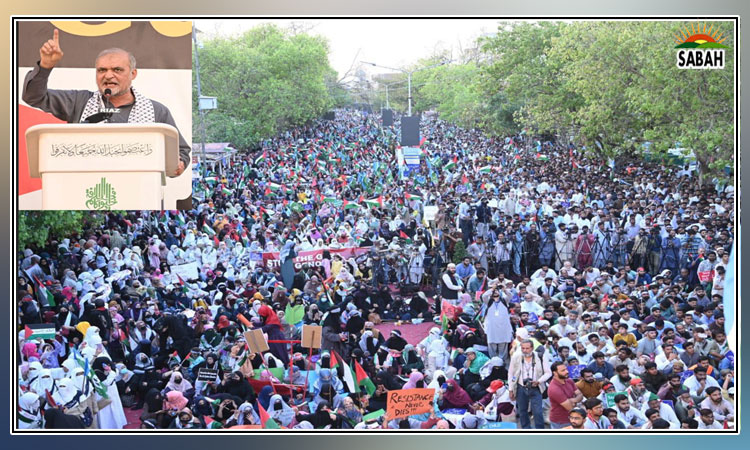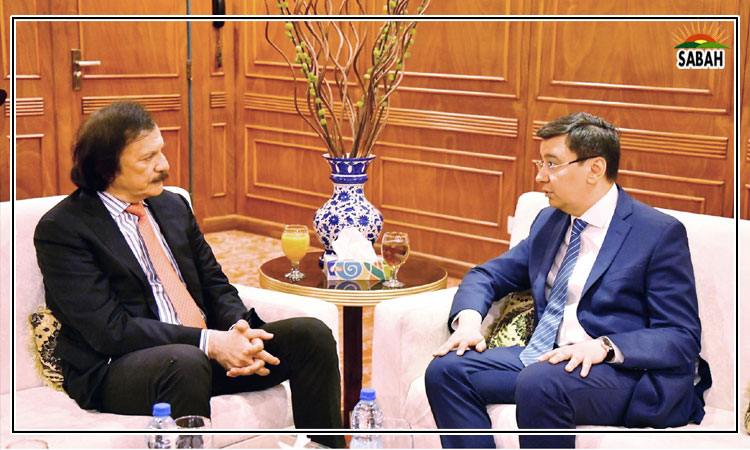How to combat terror financing…Dr Maqsood Ahmed
Pakistan has faced significant challenges in combating terrorism financing due to its complex geopolitical landscape, porous borders, and historical links to extremist groups.
Terror financing involves the provision of funds or financial support to terrorist organizations and individuals involved in extremist activities. These funds are utilized to sustain the operational capabilities of such groups, including recruitment, training, and carrying out acts of terror. Terrorism financing poses a significant threat to global security as it allows terrorist organizations to maintain their infrastructure and expand their reach.
Pakistan shares borders with Afghanistan, a region plagued by decades of conflict and instability; the porous nature of the border has made it challenging to monitor and regulate the movement of funds, weapons, and individuals associated with terrorism.
Pakistans large informal economy provides ample opportunities for illicit financial activities, including money laundering and terrorism financing. Cash transactions and Hawala networks, an alternative remittance system, further complicate efforts to track and trace suspicious financial flows.
Pakistan has witnessed the presence of non-state actors and extremist groups within its territory. The existence of these groups has posed challenges in dismantling their financial networks effectively. But the country has made significant strides in strengthening its legal framework to counter terrorism financing and enacted laws specifically targeting money laundering and terrorism financing, such as the Anti-Money Laundering Act and the Anti-Terrorism Act. These laws aim to criminalize terrorism financing activities and enhance penalties for offenders.
Pakistan has established its financial monitoring unit (FMU) to serve as the central authority responsible for receiving, analyzing, and disseminating suspicious transaction reports. The FMU collaborates with international counterparts to share intelligence and investigate terrorism financing networks.
Recognizing the transnational nature of terrorism financing, Pakistan has actively engaged in international cooperation initiatives. It has worked closely with the Financial Action Task Force (FATF), an intergovernmental body combatting money laundering and terrorism financing, to implement recommended measures and improve its compliance with international standards.
Pakistan has also undertaken reforms to strengthen its financial sectors resilience against terrorism financing. Banks and financial institutions have implemented the robust know your customer (KYC) and customer due diligence (CDD) procedures to identify and report suspicious transactions promptly. The Pakistani government, in collaboration with civil society organizations, has launched awareness campaigns to educate people about the dangers of terrorism financing. These initiatives aim to encourage citizens to report suspicious activities and discourage them from unknowingly contributing to terrorism financing.
Through legislative measures, international cooperation, financial-sector reforms and public awareness campaigns, Pakistan is striving to dismantle terrorism financing networks and improve its overall security situation. Addressing terror financing requires a comprehensive and multi-faceted approach. It is significant to continuously review and update the existing laws related to terrorism financing to ensure they are robust, comprehensive, and in line with international standards. Implementing strict penalties for offenders and streamlining the prosecution process is required to ensure swift and effective legal action.
Strengthening border security measures by employing advanced technology, such as biometric systems and surveillance equipment, to monitor and control the movement of individuals, funds, and goods across borders are also significant steps to be taken in collaboration with neighboring countries to share intelligence and coordinate efforts.
It is also essential to invest in training and capacity-building programmes for financial intelligence units (FIUs) to enhance their ability to identify, analyze and act upon suspicious financial transactions and ensure effective coordination and information sharing among FIUs, law-enforcement agencies and financial institutions.
There is a need also to address the informal economy by promoting financial inclusion and encouraging the use of formal banking channels and regulating informal money transfer systems, such as Hawala, to minimize their potential for exploitation by terrorist financiers.
By strengthening collaboration with international partners, including intelligence agencies, financial institutions, and organizations like the FATF, sharing information, intelligence, and best practices to identify and dismantle cross-border terrorism financing networks, a robust mechanism may be devised and continue to enhance anti-money laundering (AML) and counter-terrorism financing (CTF) measures within the financial sector.
Implementing the KYC and CDD procedures, regularly carrying out the audit of financial institutions for compliance, and establishing mechanisms for reporting suspicious transactions promptly can also tackle terror financing.
It is essential to conduct sustained public awareness campaigns to educate citizens about the consequences of terrorism financing and encourage people to report suspicious activities and provide secure channels for reporting, ensuring protection for whistleblowers. It is also recommended to implement targeted sanctions against individuals and entities involved in terrorism financing, freezing their assets and restricting their access to the financial system. This will strengthen international cooperation to track and seize the illicitly obtained assets.
There must needs be investment in programmes that facilitate the rehabilitation and reintegration of individuals involved in terrorist activities by providing vocational training, education and psychological support to help them reintegrate into society as productive citizens. This can be done by regularly assessing the effectiveness of implemented measures and adapting strategies based on emerging trends and challenges, conducting risk assessments, evaluating vulnerabilities, and making necessary adjustments to stay ahead of evolving terrorism financing methods.
Addressing terrorism financing is a long-term commitment requiring the concerted efforts of governments, financial institutions, law-enforcement agencies, and civil society. By implementing comprehensive measures and fostering international collaboration, Pakistan can make significant progress in combating terrorism financing and ensuring a safer and more secure future for its citizens.
It is pertinent to implement comprehensive educational programmes that promote peace, tolerance, and critical thinking, emphasize the importance of rejecting extremist ideologies and the consequences of terrorism financing, foster a culture of reporting suspicious activities and encourage citizens to play an active role in countering terrorism financing.
Other steps include addressing socioeconomic disparities and improving living conditions in marginalized areas and supporting initiatives that promote economic growth, job creation, and access to basic services such as education and healthcare. And by reducing poverty and inequality, the appeal of extremist ideologies may diminish. It is also recommended to enhance the capacity and independence of law-enforcement agencies, judiciary, and financial regulatory bodies and combat corruption and ensure rule of law to strengthen governance structures by promoting transparency, accountability, and effective implementation of anti-terrorism financing measures.
Developing and disseminating counter-narratives that challenge extremist ideologies is also essential to provide rehabilitation programmes for individuals involved in terrorism financing, focusing on their reintegration into society through education, vocational training, and psychological support. It is also suggested to conduct intelligence-driven operations to disrupt and dismantle terrorism financing networks by identifying and apprehending key financiers, freezing their assets and prosecuting them under the existing laws.
Strengthening border controls through increased surveillance, intelligence sharing, and cooperation with neighboring countries and deploying advanced technology and trained personnel to detect and prevent the illicit movement of funds and individuals is also needed.
It is also important to establish effective communication channels and mechanisms for sharing intelligence among law-enforcement agencies, financial institutions, and FIUs, encourage timely reporting of suspicious activities and facilitate cooperation to track and disrupt terrorism financing flows.
Besides prioritizing the enactment and implementation of comprehensive legislation targeting terrorism financing, it is also recommended to strengthen penalties and legal mechanisms to expedite prosecutions and address any legislative gaps or weaknesses identified through regular evaluations.
It is important to note that short-term solutions should be implemented in parallel with long-term strategies to address the root cause of terrorism financing. A comprehensive approach that combines immediate actions with sustained efforts will help combat terrorism financing in Pakistan.
Courtesy The News












